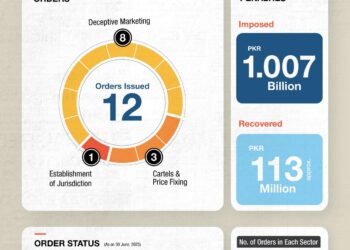ISLAMABAD : The Pakistan Solar Association (PSA) has proposed the government to constitute a Committee including industry experts to develop a sustainable and balanced framework for distributed solar energy systems in Pakistan.
In a letter to Prime Minister, Shehbaz Sharif and Power Minister, Sardar Awais Leghari the Association has stated that the recent proposed changes impacting solar energy users, particularly the elimination of the current system of netting off import and export units, and the introduction of a fixed buyback rate of Rs. 10 per unit for all exported solar energy–would severely impact investment in rooftop solar systems.
Under the current net metering system, the energy exported in off peak by consumers was given equal value to off peak imported energy, which typically ranged from Rs. 50 to Rs. 70 per unit. This allowed for a one-to-one adjustment through netting off.
For example, if a consumer imported 1,000 units of electricity (costing between Rs. 50,000 and Rs. 70,000) and exported 1,000 units back to the grid, both would cancel each other out, resulting in zero additional cost to the consumer. This mechanism provided direct savings of Rs. 50,000 to Rs. 70,000 for the user.
However, with the proposed amendments, the cost of imported units would remain at Rs. 50 to Rs. 70 per unit, while exported units would be valued at only Rs. 10 per unit. This means that exporting 1,000 units would earn the consumer just Rs. 10,000, while the import cost would still range between Rs. 50,000 and Rs. 70,000. This would result in an 80% to 85% reduction in consumer savings, representing a substantial financial loss and imposing an 18% sales tax on exported units-risk slowing down Pakistan’s nascent solar energy growth.
” These amendments will not only affect individual consumers but also have far-reaching consequences for our economy, energy security, and the overall investment climate,” said the Association.
Under the current system, Consumers (a person who acts as both a producer and a consumer) earned approximately Rs. 50/kWh, ensuring 2-2.5-year payback periods for typical 5-10 kW systems. The new Rs. 10 rate would slash earnings by 80%, extending payback times beyond financing loan terms for smaller systems. While larger systems may retain a 5-6-year payback subject to self consumption, reduced incentives will curb new investments.
” If the proposed changes are implemented, grid consumption will be billed at full tariff (up to Rs. 60), while exports earn just Rs. 10, making rooftop solar far less viable.
Users would pay full price for evening and night-time consumption, reducing savings for most solar users. This shift allows DISCOS to buy low and sell high, shrinking solar benefits by 80-85% and discouraging investment,” PSA added.
Regarding the 18% sales tax on solar energy exports to the grid, in February 2025, PSA said that the Federal Tax Ombudsman (FTO) ruled that DISCOs must tax the full units delivered from the grid, disregarding net-metered solar exports. Since the Sales Tax Act does not recognize net metering, all grid-supplied electricity is taxable, even if a consumer exports power. This results in prosumers paying an 18% tax on gross grid imports and likely facing deductions on credits. Aimed at plugging a Rs. 9.8 billion revenue gap, this policy effectively taxes solar-fed energy and undermines incentives-unlike most countries, which exempt or zero-rate such taxes to promote renewables.
According to solar industry, these proposed amendments would hinder solar adoption in Pakistan, just as it was gaining momentum. The industry fears contraction, job losses, and deterred investment due to policy instability, pushing capital to more supportive markets like Africa or the Middle East. Consumers lose an important way to lower electricity costs, forcing them to rely on expensive grid power or unaffordable battery storage. At a time when other nations are expanding renewable energy, these policies would hinder Pakistan’s progress, increasing dependence on expensive, polluting fossil fuels. With less distributed generation, electricity tariffs will remain high, limiting consumer savings and making industries less competitive. The economic consequences are also significant. Reduced solar adoption means forfeiting foreign exchange savings on fuel imports and missing job creation opportunities. Meanwhile, payments to independent power producers (IPPs) will continue straining finances, as the amendments fail to address this core issue.
Energy sustainability is another major concern. Solar power is key to a secure and sustainable future yet discouraging it now could delay Pakistan’s goal of reaching 30% renewable energy by 2030. This would put additional pressure on the grid and fuel supply in the long run.
PSA is of the view that policy instability creates uncertainty for investors. Whether a homeowner considering solar panels or an international developer planning large-scale projects, inconsistent regulations deter investment-not just in solar but across Pakistan’s power sector.
” The Government should adopt a more balanced approach to solar policy rather than slashing incentives outright. A gradual reduction in buyback rates can ease financial strain while keeping solar attractive,” the Association said adding that implementing a tiered tariff system-where larger commercial installations receive slightly lower rates than small residential ones-can ensure subsidies are targeted effectively.
PSA has proposed that introducing modest fixed charges for net-metering users can help cover grid costs without dismantling the mechanism entirely, as seen in other countries, suggesting that Pakistan should a cue from regional peers like India and Bangladesh, which are strengthening net metering rather than rolling it back. Aligning with successful models and collaborating through SAARC or bilateral channels can help refine renewable energy policies.
The long-term economic benefits of a strong solar sector far outweigh the short-term costs of supporting it. Pakistan’s industrial growth depends on affordable and sustainable energy-renewables are the solution, not a hindrance. Instead of harsh rollbacks, the country should pursue a well-balanced strategy that addresses utility concerns while ensuring continued momentum for renewable energy. By making the cost of its abundant sunshine, Pakistan can secure an energy future that is both economically and environmentally sustainable, the Association added.
PSA has suggested that before implementing any fundamental and transformative changes, it is essential to engage in meaningful consultations with all relevant stakeholders. This would foster transparency, addresses technical and economic feasibility, and helps balance the interests of businesses, consumers, and sustainability goals. A clear, transparent, and gradual roadmap must be developed through this consultative process to avoid creating uncertainty or unrest in the market.
” We recommend allowing a minimum transition period of one year to ensure the industry has adequate time to prepare and adapt, thereby maintaining market stability and investor confidence,” PSA said proposing the Economic Coordination Committee (ECC) and the Ministry of Energy establish a committee that includes industry experts and all stakeholders. This committee can work together to develop a sustainable and balanced framework for distributed solar energy systems in Pakistan. Such a framework is not only vital for the growth and survival of our industry but is also critical to advancing Pakistan’s energy independence, reducing the burden on the national grid, and promoting economic stability.
Ends














